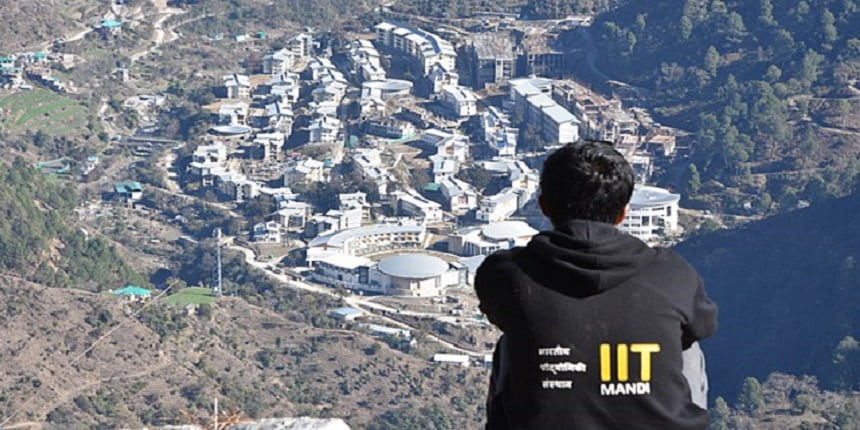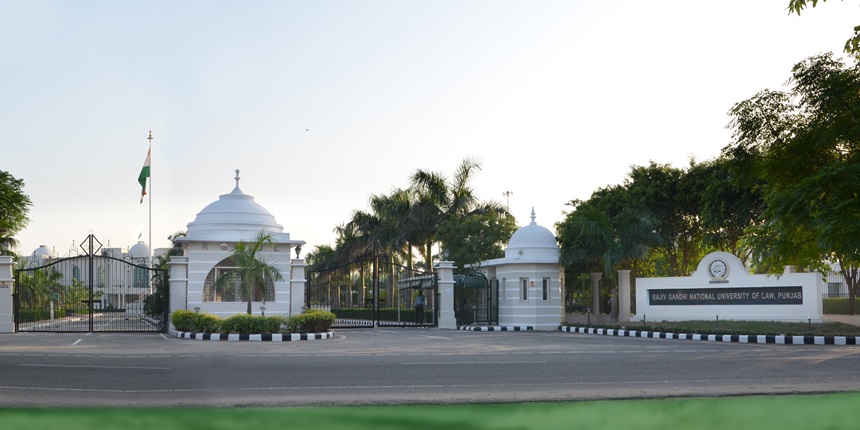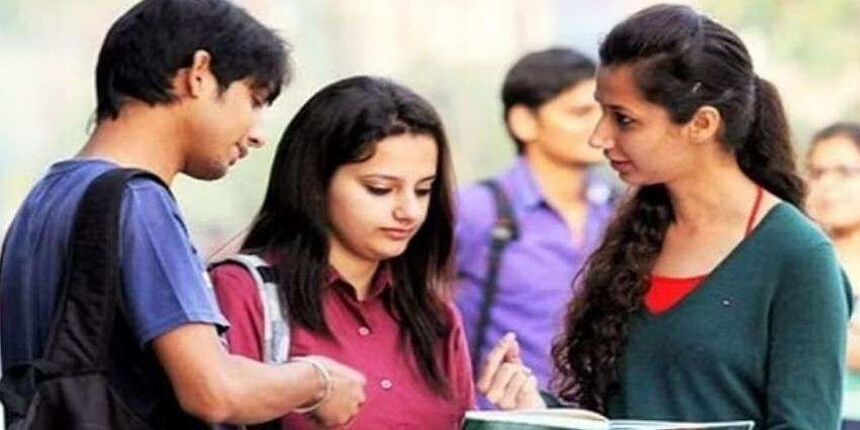JNU’s Hostel Mess: Students face water shortage, broken ceilings, crowding, fee hike
JNUSU Polls 2024: Jawaharlal Nehru University’s crumbling infrastructure will be a major issue in the upcoming students’ union elections.
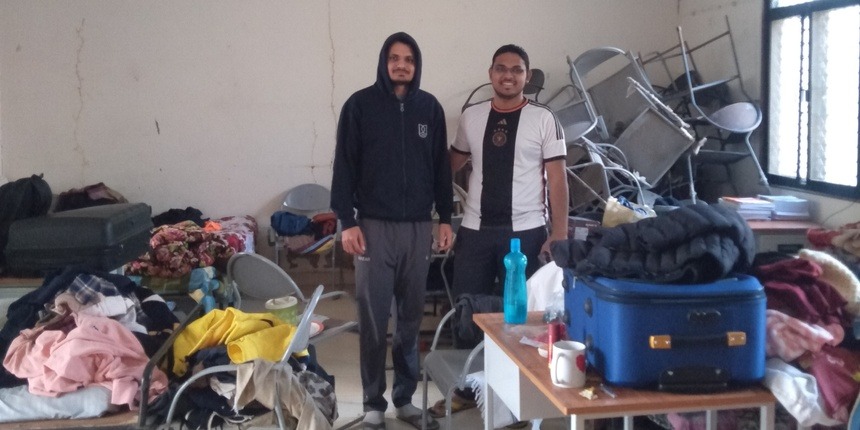 Postgraduate students in the dormitory of JNU's Lohit hostel. (Image: Sanjay)
Postgraduate students in the dormitory of JNU's Lohit hostel. (Image: Sanjay)Sanjay | March 18, 2024 | 10:43 AM IST
NEW DELHI: In April 2022, Jawaharlal Nehru University (JNU) student Md Fasihul Hasan suffered a “traumatic incident” after a portion of the bathroom ceiling collapsed at Sabarmati hostel and fell on his head. From Bihar’s Aurangabad, Hasan had moved into the hostel in February 2022. He is now a postgraduate student of German literature.
“This happened during my second year of BA. I went to the washroom at 10:30 am and suddenly, a chunk of the ceiling fell hitting the left side of my head, back and foot. I was briefly unconscious but somehow managed to come out,” Hasan told Careers360. A senior noticed he was bleeding profusely and Hasan was taken to Safdarjung hospital where he received five stitches.
Doctors who treated Hasan had told him that if the chunk had fallen on the top of his head, it would have permanently impaired his faculties.
Access to higher education had come after much struggle. Hasan’s mother passed away in 2019; his father, a driver, worked hard to send him to a top-ranking university. “It is a matter of great concern that such serious incidents are happening at such a prestigious university,” he said.
Many of the central university’s hostels, academic buildings and dormitories are in need of urgent repair. Students have complained that their academic activities suffer due to lack of basics like water supply, sanitation and functioning electrical equipment.
Renovation and repair of hostels has been a long-standing demand of major student organisations contesting JNU Students Union (JNUSU) elections, resuming for the first time since Covid-19, in 2024. Over the past years, JNU saw student protests demanding resolution of infrastructure issues.
Satish Chandra Garkoti, Rector-I of JNU told Careers360 that the university is adding new facilities and that minor repairs are being done continuously.
JNU hostels, fee hike
JNU began its academic activities in 1969 and now stands second among Indian universities in the National Institutional Ranking Framework (NIRF) Rankings 2023.
The campus has 18 hostels for men and women and one complex accommodating married students with a total capacity of 5,500 candidates. In the 2022-23 academic session, there were 9,515 students in JNU.
Through a new hostel manual in January 2020, JNU introduced service charges of Rs 1,700 and hiked the one-time refundable mess security fee from Rs 5,500 to Rs. 12,000. The rent was raised from Rs 20 per month to Rs 600 for a single-seater room, and from Rs 10 to Rs 300 for a double-seater. Students had protested.
The manual said that except for Subansir hostel, which is for married research scholars, and Yamuna hostel, students in the remaining 16 hostels do not pay electricity, water and other service charges.
“Therefore, JNU is incurring an expenditure of more than Rs 10 crore per annum towards the above charges which has become unsustainable,” it said.
Problems remain
Despite the increase in fees, problems persist, said students. “The quality of food is so bad that we just eat it to survive and there are worms in the water coolers. Tapti rooms are for single persons but allocated to two people. There are also many students who have submitted their thesis and completed their course but are not vacating their rooms for new students,” said a boarder of Tapti, a hostel for women.
Hasan, who was injured at Sabarmati hostel, said that during the rainy season, rain drips through the ceilings, chunks of plaster and cement fall off. “We have to place buckets in our rooms and use umbrellas while walking to the hostel entrance from them,” he said.
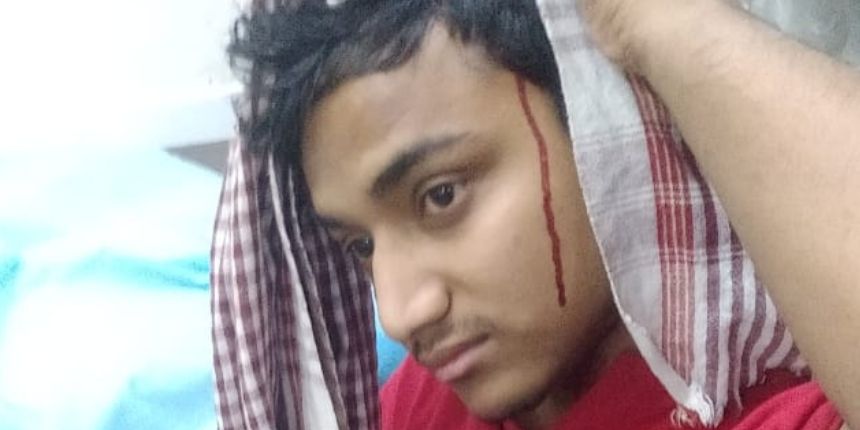 JNU student Md Fasihul Hasan, who was injured after bathroom ceiling collapsed on his head in April 2022. (Image: Special Arrangement)
JNU student Md Fasihul Hasan, who was injured after bathroom ceiling collapsed on his head in April 2022. (Image: Special Arrangement)
Light and water
Hundreds of first-year undergraduate (UG) and postgraduate (PG) courses students admitted in 2023-24 have been living in dormitories of different hostels since September. Each dormitory houses 30 to 50 students.
Ashish Kumar, in first year MA Labour Studies, has been living in Lohit’s dormitory with 30 others. They don’t know when they’ll get rooms.
“We face two major problems here – lights and water supply. We cannot study here because the tubelights do not work properly. We have to fetch water from the Lohit hostel. During summers, it becomes unbearable to stay inside the hostel rooms due to the tin roof,” he said.
Rajat Mandal, in first year of MA Economics, said staying in Lohit’s dormitory is affecting his studies. “We have to go to the library to study and often we do not get a seat as it remains full all the time. We can’t even study at night as other students want us to turn off the lights. There is no personal space,” he said.
JNU is primarily a postgraduate and research university with an older cohort of students.
JNU infrastructure crisis
After heavy rainfall on July 27, 2022, portions of a balcony and ceiling collapsed in two separate hostels.
Rohan Kumar, a former JNU student, described it as a life-threatening incident. He joined the masters programme in medieval history in November 2021 and was given a ground-floor room at Lohit in June 2022.
“During the last week of July 2022, I was attending a tutorial lecture through my laptop, sitting at the desk when I got a call from my friend. As soon as I leaned back while talking to him, a portion of the ceiling fell on my laptop. If I had not leaned back, I would have received life-threatening injuries,” he said.
Rohan had informed the authorities about the damaged ceiling when he was allocated the room but no action was taken. Repair work began a month after the incident.
“When I contacted the authorities, they told me there was only one mason and one labourer for repair work in all the hostels; my complaint go on the waiting list. I got cement and white putty from a contractor who was building the Barak hostel [for students from the northeast] at that time. Later, the caretaker called a mason and the ceiling was repaired. It took a month,” he recalled.
In April 2023, students staged a protest over water shortage in several hostels. September saw a protest at the vice-chancellor's office over water shortage and the slow pace of hostel renovations.
“Water crisis is not a JNU-specific problem. It is a problem that the entire National Capital faces. We receive water from Delhi Jal Board (DJB) and JNU cannot have its own water supply system. We ensure the availability of water, however we face water shortage during summers sometimes,” said Garkoti.
In a report titled ‘JNU: The State of the University’ released in September 2023, Jawaharlal Nehru University Teachers’ Association (JNUTA) stated that a “significant part of JNU’s infrastructure is also crumbling and that there are no funds available for even routine maintenance.”
“Minor repair works are being done continuously. We were sanctioned Rs 56 crore by the government for major repair work and we carried out maintenance work in hostels, academic buildings and residential areas,” Garkoti said.
According to a Times of India (TOI) report, in November 2023, the ministry of social justice and empowerment asked JNU to look into problems of accessibility faced by disabled students on campus.
According to JNU’s 2022-23 annual report, 13 hostels have ramps. “Though certain measures (such as putting special ramps, disabled-friendly toilets, etc.) have been taken earlier in order to facilitate persons with disabilities, there were areas which necessitate further attention and improvement to make the university accessible for disabled persons,” said the report adding that lifts have been installed in various buildings.
Also read Delhi HC asks JNU to provide hostel accommodation to visually impaired student
HEFA loans
In response to a Right To Application (RTI) filed by student organisation COLLECTIVE, JNU shared that it spent Rs 20,79,608 in 2021-22 compared to Rs 52,55,831 in 2018-19 on hostel maintenance – a reduction of 60.4% over four years.
Expenditure on hostel maintenance (In Rs.)
Year | Expenditure |
2018-19 | 52,55,831 |
2019-20 | 68,13,650 |
2020-21 | 42,94,149 |
2021-22 | 20,79,608 |
“Continuous infrastructure crisis in JNU is arising out of the defunding of the University Grants Commission (UGC) after National Education Policy (NEP) 2020. In the interim budget 2024-25, finance minister Nirmala Sitharaman announced a 53.5% cut in UGC funds – Rs 2,500 crore from Rs 5,360 crore in 2023-24. This is the major reason why JNU is being pushed to take loans from the Higher Education Financing Agency (HEFA), whose burden is ultimately being borne by students,” said Sourya Majumder, a JNU research student and joint secretary of COLLECTIVE.
In February 2024, JNU received a HEFA loan of Rs 455 crore and is in the process of creating infrastructure to support faculty members developing short-term online courses. JNU aims to foray into the e-learning segment this year.
Garkoti said that infrastructure is a one-time investment and denied there are cuts in the budget. After receiving the loan, the tender process for the construction of the engineering and management schools buildings has been completed, he said. “These two buildings will be in place in the next 18 months and classes will begin. Academic complex, lecture hall complex and trans-disciplinary research building will also be constructed. The construction of a boundary wall and an approach road to Barak Hostel is also underway. We will soon start providing accomodation to students in the newly hostel,” he said.
JNUSU 2024 polls
The last JNUSU elections were held in 2019-20. They will now be held on March 22.
Massud Raza Khan, vice president JNU’s National Students Union of India (NSUI), and a PG student residing in Jhelum hostel said the biggest demand of the students is the renovation of hostels.
“If we win, we will ensure the availability of water coolers on every floor in all hostels and academic buildings. We will also try to install washing machines in every wing of the hostels. In my School of Language (SL) building, several classrooms do not have projectors and many have damaged ones. We will ensure proper working equipment,” he said.
Central universities, which received the highest allocation of Rs 11,528.90 crore in the last budget, bagged Rs 15,928 crore in budget 2024, an increase of over Rs 4,300 crore.
Ambuj Mishra, national media co-convenor of Akhil Bharatiya Vidyarthi Parishad (ABVP) and research student at JNU said his organisation will raise the issues of water shortage and e-rickshaws on campus. “In 2015, ABVP staged a big sit-in protest for 15 days at the administration block and we were able to enable WiFi in hostels. …We now demand the fast construction of the boundary wall and allotment in Barak hostel. If voted to power after JNUSU, we will also focus on increasing the number of e-rickshaws, security on campus and water shortage,” he said.
Follow us for the latest education news on colleges and universities, admission, courses, exams, research, education policies, study abroad and more..
To get in touch, write to us at news@careers360.com.
